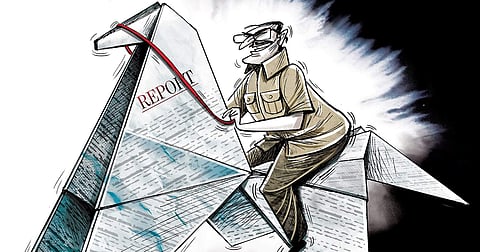

The Union government has embarked on an unprecedented adventure of constituting a large contingent of officers who will travel in small groups to different districts to evaluate the progress of selected Central government schemes coming under the Extended Grama Swaraj Abhiyan (EGSA). The initiative is based on the idea that those who fund have the right to inspect and evaluate. The Centre’s eagerness to understand the nature of implementation of EGSA cannot be faulted as the quality of implementation will naturally be uneven and suboptimal. But the present scale and scope of the operation are quite extraordinary and raise several disturbing issues.
Without the instrumentality of the state government’s machinery, the Centre cannot implement its welfare and development schemes. The administrative relationship between the Centre and state governments has evolved over the past several decades. Not that it has been a hassle-free relationship. There are glitches all the time. Yet, in our constitutionally defined federal polity, this relationship has a sanctity that goes beyond the practical compulsions of efficiency and accountability.
According to media reports, the Centre has directed 800 Central government officers to visit 117 ‘aspirational districts’ covering 49,178 villages from June 1 to August 15. If we include a similar exercise done in May this year, 65,000 villages would be covered in total. The teams are expected to convene meetings of beneficiaries, local officials of the state government, bank representatives and other local officers. The feedback they receive will form part of a databank.
What is in store for these visiting teams? Of course there will be a barrage of complaints from the beneficiaries about the local functionaries most of whom may either be incompetent, corrupt, hand in glove with the local exploitative leadership, outrightly unhelpful or indecisive. Many of the field- level functionaries will complain about the lack of clarity in the instructions received from ‘the top’, lack of facilities, ambiguity in the specifications and procedures, besides political interference. Then there will be the ubiquitous complaint of shortage of staff and prevailing vacancies. The tier above them could blame their subordinates for apathy and their bosses for lack of clarity, absence of administrative and financial authority, and delayed decisions.
What will then be the conclusion of this massive outreach and monitoring exercise other than a bundle of complaints and grievances and a compilation of inadequacies? No two states are similar in their administrative culture and efficiency. It is a fact that any scheme from the Centre gets customised in its operational details in tandem with similar state government schemes.
It is not that the Centre, in the past, used to sit idle, meekly awaiting responses and results after releasing funds to the states. There have always been rigorous reviews, inspections, appraisals and sometimes reprisals. Central ministries always had their quarrels with states on their financial indiscipline and administrative lethargy while the states often complained about the unsuitability of the programmes and the lack of flexibility in the norms to suit local conditions. Nevertheless, whenever the Centre and state cooperated, communicated and understood each other, development schemes have been able to do wonders. And whenever governments played unnecessary games, taxpayers’ money has been wasted by lackadaisical implementation. By implementing many programmes under several five-year plans, an administrative ethos and relationship had evolved between the states and Centre within the spirit of cooperative federalism. The erstwhile Planning Commission should be credited with this achievement, which is quite significant in a country of astounding political and social diversity. This is a nuanced relationship where the financial strength of the Centre and the administrative apparatus of the states are harmonised to achieve the desired results.
When the Planning Commission was alive there was an institutional memory at the national level that helped mediate between the Centre and the states in such matters. Its successor Niti Aayog, however, seems to have no such mandate. In such a situation, the style of this outreach which stymies state governments and puts them on the dock for poor progress poses larger issues of Centre-state relationship. The role of the Centre is neither that of a funding agency nor the status of the states that of recipients of grants. Any exercise, however well-intentioned it may be, should not convey the notion of a patron-client relationship. That will, no doubt, undermine the fabric of the federal polity that is India.
Another inherent limitation of such exercises is that they finally end up as a fault-finding game, having no positive and sustainable impact.
Evidently such short-term appraisal missions do not have the mandate to suggest long-term structural and systemic changes. The energy that would be spent in finding fault and flagging the shortcomings should ideally be harnessed to improve service delivery systems that prevail in the states. But to accomplish this, the Centre should involve the states as willing partners in revamping administrative systems. No state would willingly derail any scheme that would benefit its people. Yet schemes flounder. This is an opportunity to identify and correct the procedural, cultural and administrative constraints entrenched in the system with a determination that defies political differences. The nation would be grateful if this is converted into a constructive opportunity aimed at pointed administrative reforms and capacity building instead of being used as a political cudgel. The current massive outreach and evaluation need to be salvaged from deteriorating into a spat between the Centre and the states. Statesmanship is all about seeing the larger picture and resisting the temptation of the possibilities of narrow political utility.
K Jayakumar
Former Chief Secretary to Government of Kerala and former Vice Chancellor of Malayalam University
Email: k.jayakumar123@gmail.com